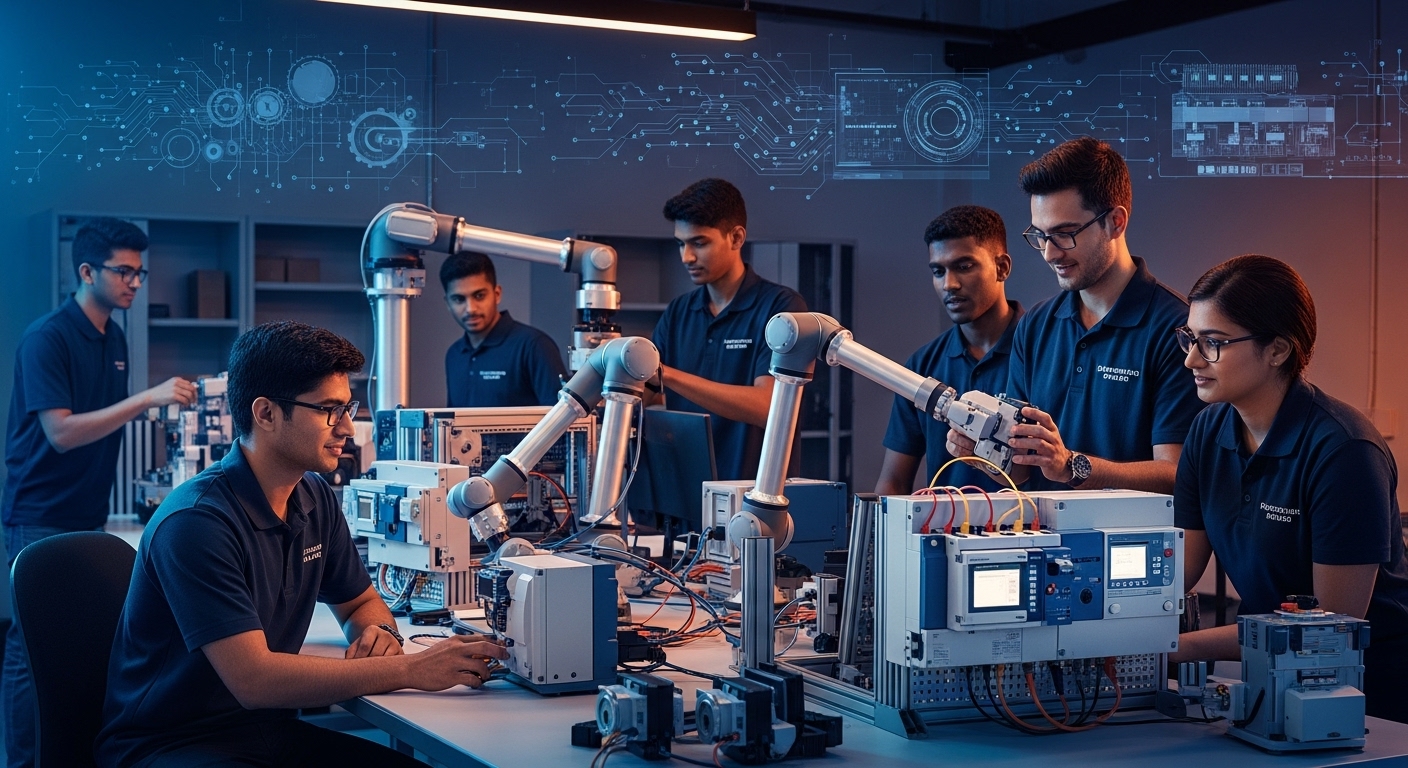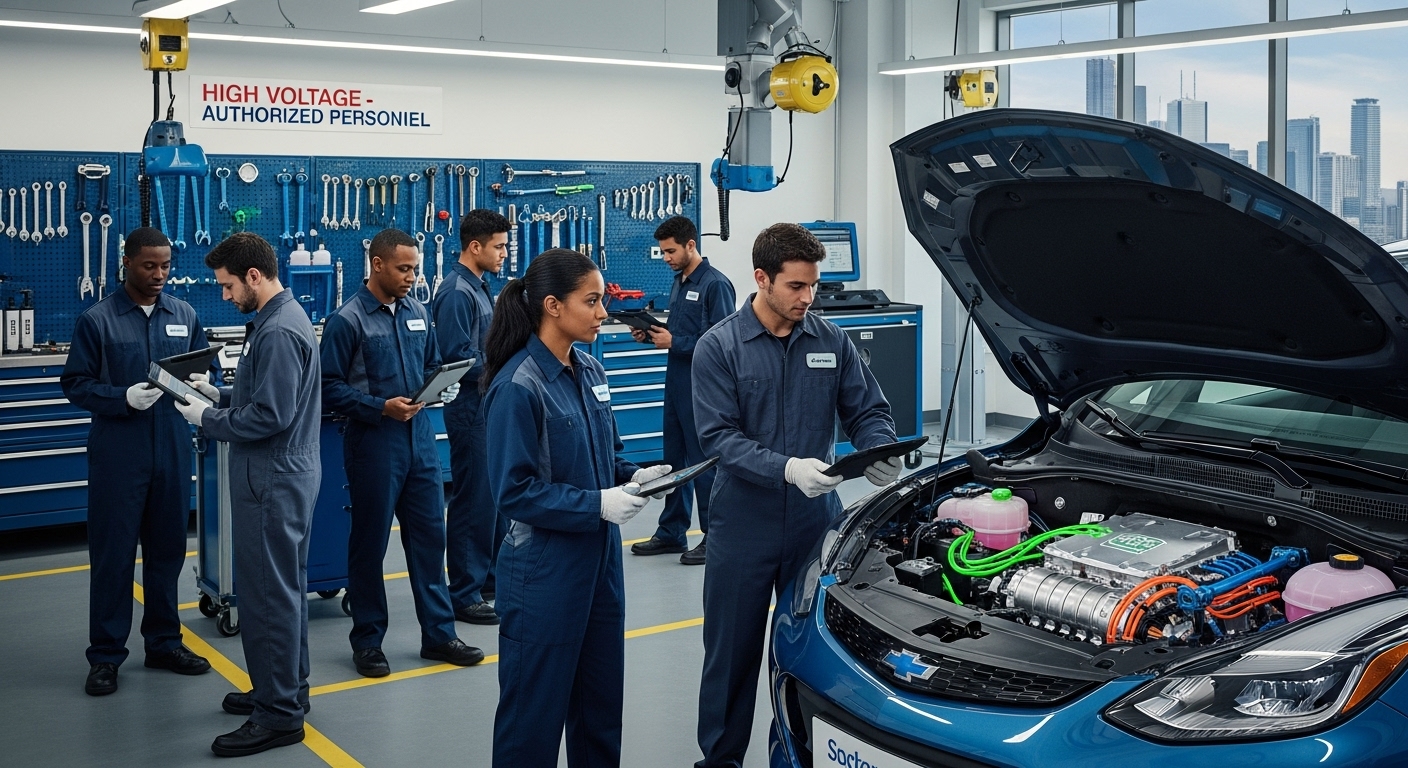Robotics & Automation Technician Training in Toronto – [Hands-On Certification ]

Canada is rapidly becoming a hub for robotics and automation, and Toronto sits at the heart of this technological boom. From advanced manufacturing plants to cutting-edge research labs, the demand for skilled robotics technicians is growing faster than ever.
Whether it’s programming industrial robots, maintaining automated systems, or integrating smart technologies, businesses across Ontario are actively seeking trained professionals who can hit the ground running.
If you’ve ever wondered how to turn your interest in robotics into a hands-on career, this guide is for you. We’ll walk you through the best Robotics & Automation Technician training in Toronto, show you how to get certified, and explain why hands-on experience matters more than ever in today’s job market.
Why You Should Read This
Get a Clear Path: Understand the training programs that lead directly to in-demand jobs in Toronto and across Canada.
Hands-On Focus: Learn why practical, lab-based experience sets you apart from other candidates.
Career Boost: Discover certification options that increase your employability and earning potential.
Canadian Perspective: All advice and examples are tailored specifically to the Canadian job market, standards, and opportunities.
By the end of this guide, you’ll know exactly how to start your journey as a certified robotics and automation technician, and why now is the perfect time to do it.
Who Should Enroll
If you’re thinking about a career in robotics or automation here in Toronto, this training is a perfect fit for several types of learners.
High School Graduates & College Students
Toronto has a growing tech scene, especially in robotics and industrial automation. For students finishing high school or college, this program provides practical skills that go beyond textbooks.
You’ll learn how machines work, how to program automated systems, and even how to troubleshoot issues, skills that make you job-ready in Canada’s tech workforce.
Working Professionals in Manufacturing or IT
Already working in manufacturing, IT, or even engineering roles? Robotics and automation are increasingly part of everyday operations. Enrolling in hands-on training helps you upskill and remain competitive in Toronto’s tech-heavy industries. Companies like Magna, Celestica, and local manufacturing startups are always on the lookout for certified technicians.
Career Changers Seeking Tech Skills
If you’re looking to switch careers, robotics training in Toronto is an excellent choice. The city’s tech ecosystem supports newcomers in tech, and there’s a growing demand for technicians who can maintain, program, and troubleshoot automated systems. By earning a certification, you can pivot into a high-growth field with strong Canadian job security.
Course Overview
The Robotics & Automation Technician program in Toronto is designed to balance theory and hands-on practice, giving you real-world skills that employers value.
Core Robotics & Automation Concepts
You’ll start by learning the basics of robotics systems, including mechanical structures, sensors, and control systems. These concepts are essential whether you aim to work in industrial robotics, healthcare automation, or smart manufacturing.
Hands-On Lab Sessions & Practical Training
Toronto-based programs emphasize practical experience. Expect to work on actual robots and automated equipment in the lab. From wiring circuits to programming robotic arms, you’ll practice skills that companies are actively hiring for.
Industry-Standard Tools and Software
The training doesn’t stop at hardware, you’ll also learn software tools widely used in Canadian industries, like PLC programming platforms, CAD software for automation design, and simulation tools. By the end of the course, you’ll be confident working with both the machines and the systems that control them.
Certification Details
In Canada, certification can be a real game-changer for a tech career, and Toronto’s robotics programs make this accessible.
Recognized Canadian Certifications
Many programs offer certificates recognized by industry associations such as the Canadian Manufacturing Technology Institute (CMTI) or specialized robotics bodies. These certifications signal to employers that you’re ready to hit the ground running.
How Certification Boosts Employment Opportunities
Toronto’s tech and manufacturing sectors value hands-on experience combined with recognized credentials. Certified technicians often find roles faster, with higher starting salaries, in positions like automation technician, robotics maintenance engineer, or control systems technician.
Pathways to Advanced Robotics Specializations
Once you earn your basic certification, you can pursue advanced programs in AI-driven robotics, industrial automation, or smart manufacturing. Many Toronto-based companies also offer internship opportunities, allowing you to transition from classroom learning to real-world robotics projects.
Training Curriculum
Toronto’s robotics and automation programs are designed to prepare students for the real-world demands of Canadian industries. The curriculum blends theory with hands-on practice, ensuring you graduate as a job-ready technician.
Introduction to Robotics Systems
You’ll start by exploring the fundamentals of robotics, from kinematics and robotic arm mechanics to control systems and machine learning basics. Programs often include exposure to collaborative robots (cobots) used in Canadian factories and labs. Students learn how automation integrates into manufacturing, logistics, and even healthcare in Toronto.
Industrial Automation & PLC Programming
PLC programming is a cornerstone of industrial automation. In Toronto, students typically work with Siemens, Allen-Bradley, and Omron PLCs, programming and simulating real production environments. You’ll learn ladder logic, structured text, and HMI interface development, giving you practical skills that employers seek in Canada’s manufacturing hubs.
Sensors, Actuators, and Control Systems
A critical part of the curriculum involves understanding sensors (proximity, vision, and temperature) and actuators (motors, pneumatic, and hydraulic systems). Training includes configuring and testing these devices in real robotics setups, like conveyor systems and automated pick-and-place machines seen in GTA warehouses.
Robotics Maintenance & Troubleshooting
Canadian companies prioritize technicians who can troubleshoot complex systems quickly. Students learn preventive maintenance, fault diagnosis, component replacement, and system optimization. Hands-on labs often simulate real factory conditions, preparing students for high-pressure scenarios.
Safety Protocols & Compliance
Safety is a top priority. Programs teach Canadian safety standards, including CSA (Canadian Standards Association) guidelines and OHSA regulations. You’ll learn safe handling of high-voltage equipment, emergency protocols, and proper use of personal protective equipment (PPE) , skills essential in industrial settings.
Capstone Projects & Industry Simulations
Many programs culminate in a hands-on project where students design and program a small automation system or robotic solution. These projects mimic real-world problems faced by Toronto manufacturers and provide invaluable experience to include in your resume.
Toronto Training Centers & Institutes
Toronto is home to some of Canada’s most reputable robotics and automation training facilities. Here’s a comprehensive look:
George Brown College
Offers a Robotics and Automation Technician program with extensive labs and industry-aligned modules.
Students have access to Siemens PLCs, ABB and FANUC robots, and automation workstations.
Co-op placements with companies in Toronto allow hands-on experience in warehouses, automotive plants, and manufacturing facilities.
Seneca College
Known for its Industrial Automation and Mechatronics programs.
Focuses on PLC programming, robotics maintenance, and systems integration.
Partnerships with local industries provide internship opportunities and project-based learning.
Humber College
Offers programs blending robotics, electrical engineering, and mechatronics.
Hands-on labs include programmable robots, automated conveyor systems, and industrial sensors.
Humber emphasizes employability with career services, job fairs, and networking events with Toronto-based companies.
Private Institutes & Specialized Academies
RoboTech Academy: Fast-track hands-on programs for career changers or working professionals.
Automation College: Focuses on PLC programming, robotics troubleshooting, and industrial automation certifications.
Small class sizes ensure personalized attention and real-time lab experience.
Public vs. Private Options
Public colleges offer recognized credentials and access to government funding, while private institutes provide intensive short-term training ideal for career switchers.
Toronto’s ecosystem ensures both options provide access to modern labs and industry-standard robots.
Industry Partnerships & Networking
Many institutes partner with robotics companies and manufacturers in Toronto and the GTA.
Students gain exposure to real automation projects, making it easier to transition into full-time roles post-certification.
Career Opportunities in Canada
Toronto’s robotics and automation sector is growing rapidly, and skilled technicians are in demand.
Common Job Roles
Robotics Technician
Automation Engineer Assistant
Industrial Maintenance Technician
PLC Programmer
Field Service Technician
Robotics Systems Integrator
Salary & Growth
Entry-level positions in Ontario: $50,000–$65,000 per year.
Experienced technicians: $80,000+ per year, with potential for management roles.
Toronto’s tech, manufacturing, and logistics sectors are expanding, making this a high-growth career path.
Key Employers
Automotive manufacturers: Ford, Toyota, Magna
Warehousing & logistics: Amazon, Loblaws, UPS
Robotics and automation startups in MaRS Discovery District and Toronto Innovation Hubs
Research institutions like Ryerson Robotics Lab
Why Certification Matters
Canadian employers prefer candidates with recognized hands-on certification.
Skills in PLC programming, robotics maintenance, and system integration increase your employability in Toronto and across Canada.
Cost & Financial Aid Options
If you’re thinking about enrolling in a robotics and automation technician course here in Toronto, one of the first things you’ll want to know is how much it will cost. Tuition can vary widely depending on the training institute and the depth of the program.
On average, a hands-on certification course ranges from CAD 3,000 to CAD 8,000. Shorter programs or modular courses might cost less, while comprehensive, multi-month programs with extensive lab work could reach the higher end of the scale.
But here’s the good news: there are several ways to make this investment more manageable. Many Canadian institutes offer scholarships or bursaries specifically for technology and STEM programs. For example, colleges like George Brown College and private training centers often have merit-based or need-based financial aid.
Another option is government funding and grants. Programs like the Canada Job Grant provide funding for skills training if you’re currently employed or seeking employment in a new field. This can cover up to two-thirds of the tuition, which is a huge help.
Finally, some employers in Toronto’s industrial and manufacturing sectors are willing to sponsor employees for training programs. If you’re already working in a technical field, it’s worth checking with your HR department to see if they have professional development budgets.
Investing in robotics certification is not cheap, but considering the growing demand for skilled automation technicians in Ontario, it’s an investment that pays off quickly. Salaries for certified technicians start around CAD 55,000–65,000 per year, with the potential to reach over CAD 80,000 as you gain experience.
How to Enroll
Enrolling in a robotics and automation program in Toronto is easier than most people think, but it’s important to follow the steps carefully to secure your spot. Here’s a simple roadmap:
Research Training Centers – Start by identifying institutes that offer hands-on certification. In Toronto, options include George Brown College, Centennial College, and specialized private robotics academies. Look at reviews, curriculum, and lab facilities.
Check Admission Requirements – Most programs require a high school diploma or equivalent, with a background in math and science being highly recommended. Some advanced courses may expect prior experience in electronics or IT.
Prepare Your Documents – You’ll usually need your transcripts, ID, and proof of residency in Canada. If you’re applying for financial aid, have supporting documents ready.
Submit an Application – Most schools allow online applications. Make sure to fill in all the required information carefully. Some programs have rolling admissions, while others have fixed start dates, so apply early to secure a spot.
Interview or Assessment (if required) – Some institutes may ask for a short interview or assessment to gauge your readiness for hands-on training. Don’t worry – they’re mostly looking for your enthusiasm and basic technical aptitude.
Confirm Your Enrollment & Pay Tuition – Once accepted, you’ll receive an offer letter. If you’re using financial aid, make sure everything is approved before paying your portion. Some institutes also allow installment plans.
Attend Orientation & Start Training – Orientation is your chance to get familiar with lab safety, schedules, and instructors. After that, you’re ready to dive into practical robotics projects, PLC programming, and automation systems.
For Toronto residents, the key is to act early. Popular programs fill quickly because hands-on lab spots are limited. Planning ahead ensures you get a seat in the course that best fits your schedule and career goals.



